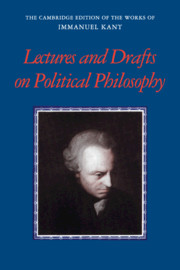Book contents
- Frontmatter
- Contents
- General Editors’ Preface
- Acknowledgments
- General Introduction
- Translators’ Remarks
- Reflections on the Philosophy of Right
- Natural Right Course Lecture Notes by Feyerabend
- Drafts for Published Works
- Drafts for Theory and Practice
- Drafts for Towards Perpetual Peace
- Drafts for the Metaphysics of Morals
- Drafts for Conflict of the Faculties
- Glossary
- Topical and Chronological Concordance
- Editorial Notes
- Index
Natural Right Course Lecture Notes by Feyerabend
Published online by Cambridge University Press: 10 December 2020
- Frontmatter
- Contents
- General Editors’ Preface
- Acknowledgments
- General Introduction
- Translators’ Remarks
- Reflections on the Philosophy of Right
- Natural Right Course Lecture Notes by Feyerabend
- Drafts for Published Works
- Drafts for Theory and Practice
- Drafts for Towards Perpetual Peace
- Drafts for the Metaphysics of Morals
- Drafts for Conflict of the Faculties
- Glossary
- Topical and Chronological Concordance
- Editorial Notes
- Index
Summary
Kant's Natural Right
Read
in
Winter Semester of the year
Gottfr. Feyerabend
INTRODUCTION
The whole of nature is subject to the will of a human being as far as his power can reach excepting other human beings and rational beings. Considered rationally, things in nature can be viewed only as means to ends but a human being alone can be viewed as himself an end. I can think of no value in other things unless I consider them as means to other ends, e.g. the moon has a value for us insofar as it lights the earth, causes the tides, etc. The existence of non-rational beings has no value if there is nothing there that can serve rational beings, i.e. if no rational being uses it as a means. Animals also have no value in themselves because they are not conscious of their existence – the human being is thus the end of creation; he can, however, also be used as a means for another rational being, but a rational being is never a mere means, instead at the same time an end, e.g. if the mason serves me as a means for building a house, so I serve him back as a means to obtain money. Pope in his Essay on Man had the goose say, “A human being also serves me for he gives me my food.” In the world as a system of ends there simply must ultimately be one end and that is the rational being.Were there no end then the means would also be in vain and would have no value. – A human being is an end so it is contradictory to say that a human being should be a mere means. – If I make a contract with my servant then he must also be an end just as I amand not amere means.Hemust also will it. – The human will is thus limited by the condition of the universal consent of the will of others. – Should there be a system of ends then the end and the will of a rational being must agree with that of every other.
- Type
- Chapter
- Information
- Kant: Lectures and Drafts on Political Philosophy , pp. 81 - 180Publisher: Cambridge University PressPrint publication year: 2016
- 3
- Cited by

